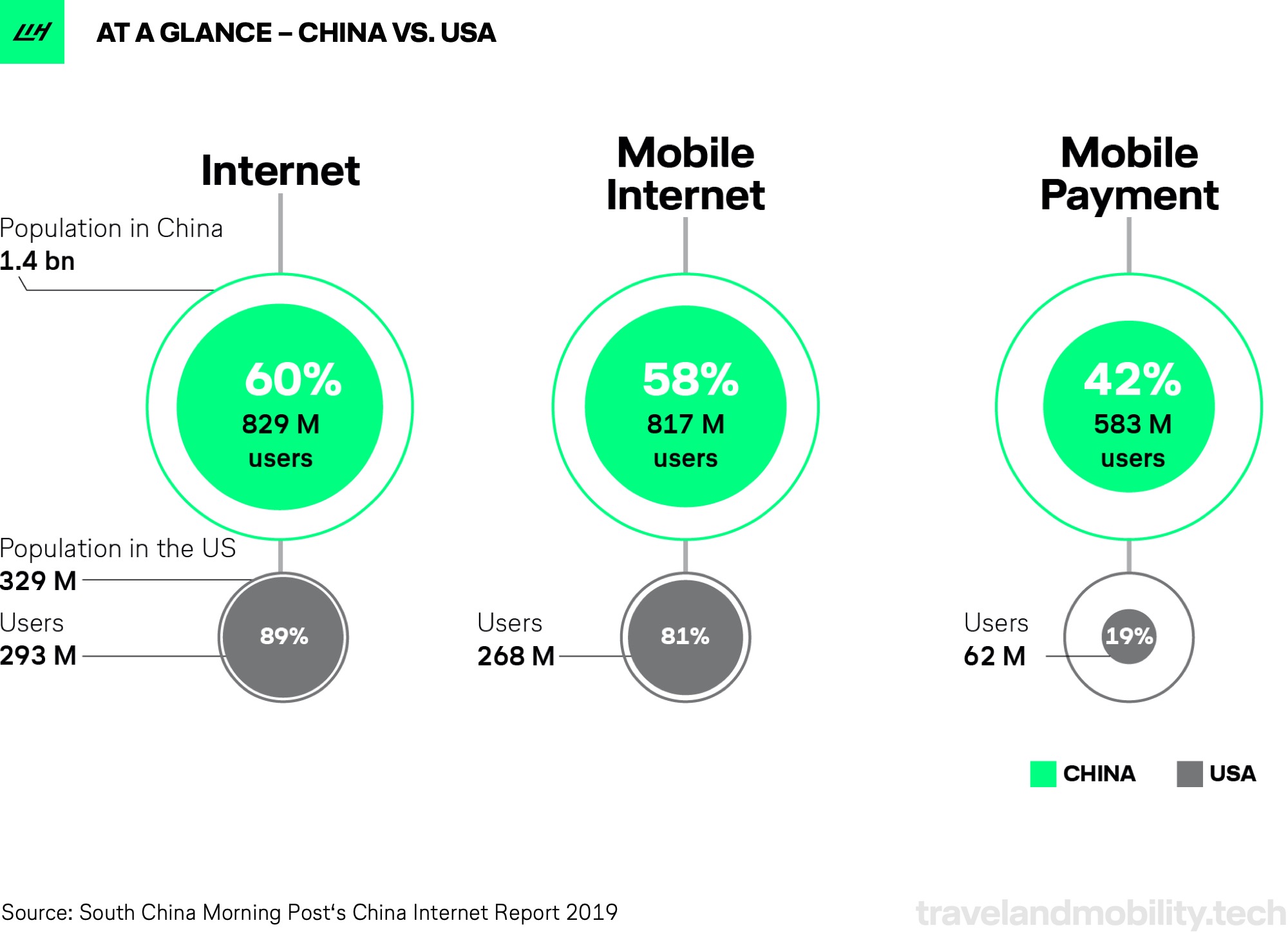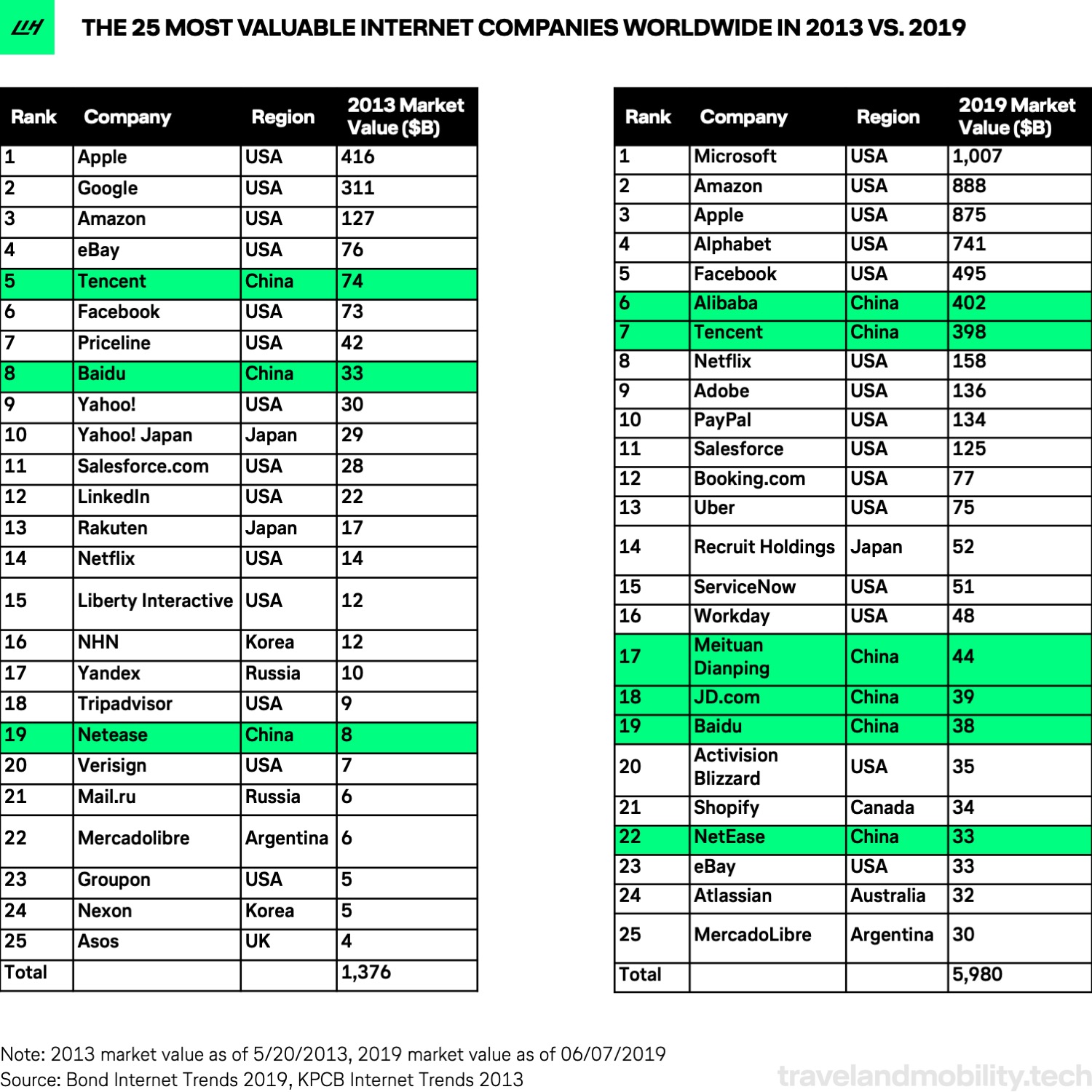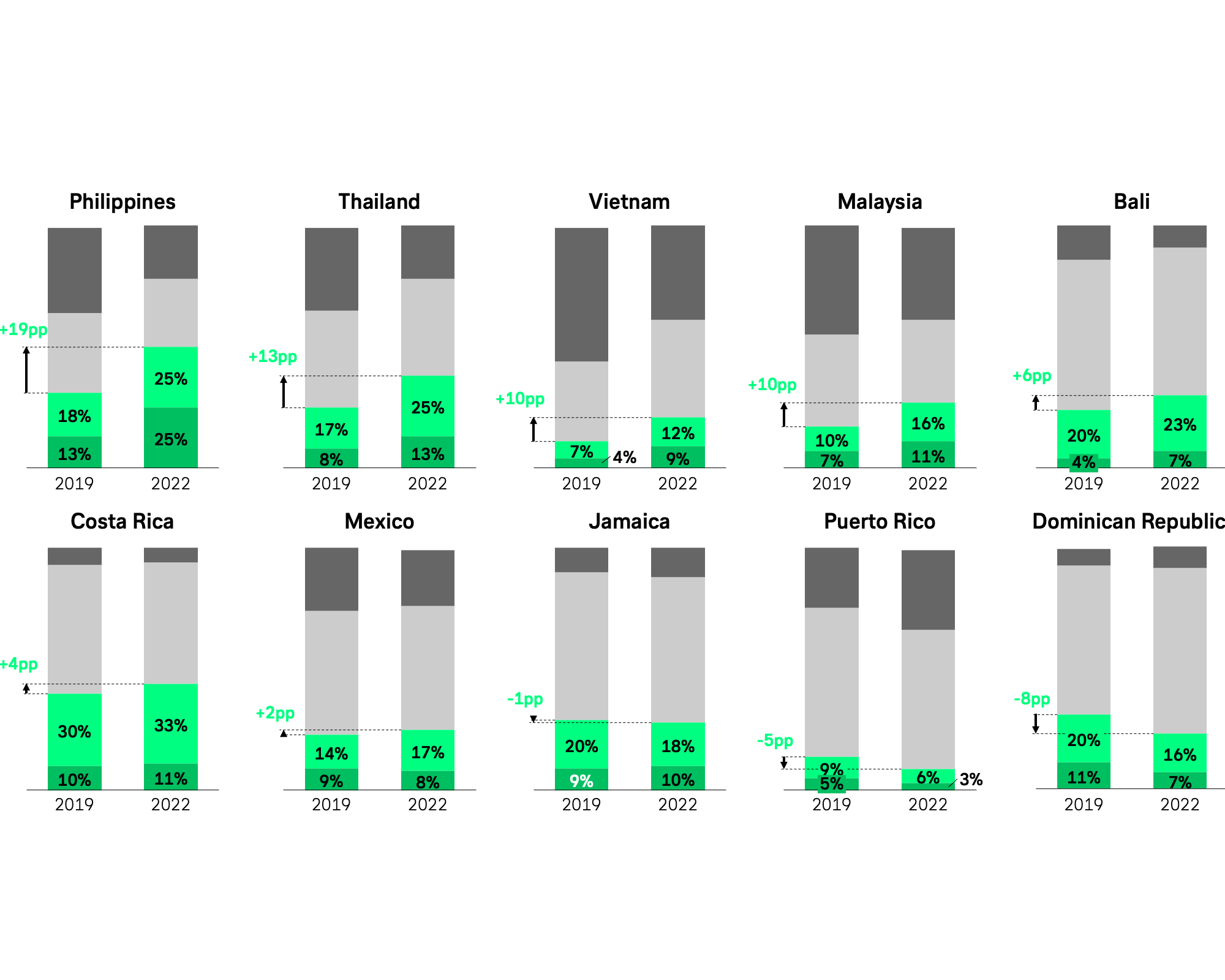You might think a 60% internet penetration rate is pretty low. And while that might be true for many countries, the sheer scale of China means that even at 60%, the country has three times the number of smartphone users and 11 times the number of mobile payment users than the U.S.
Growing network coverage, better affordability of mobile gadgets, and the expanding middle class are some of the reasons behind this development. But most importantly, China’s huge population–in particular the size of the digitally literate population–is providing the groundwork for all kinds of internet businesses.

The advantage China holds with its massive population size has already led to a paradigm shift in worldwide internet leaders. According to Mary Meeker’s latest Internet Trends Report, the aggregated market value of the top 25 highest-valued internet companies worldwide has increased more than fourfold from 2013 to 2019. China has increasingly made its presence felt on the leaderboard. In 2019, six out of those 25 internet behemoths are Chinese – as compared to only two back in 2013.

In Travel & Mobility Tech, China has become the #1 market for VC investments
The global Travel & Mobility Tech sector is no exception. Just look at the speed at which China has taken over the lead from the United States in terms of Venture Capital received by Travel & Mobility Tech startups in recent years.
Equally as impressive are Singapore, India, and Indonesia – all countries that have steadily moved up the leaderboard at a similar rate. The result is that four of the top five countries are now located in Asia.
Where to learn more about the state of tech in Asia and China?
Despite this clear trend of Asian dominance in tech, it’s often difficult for those in the Western world to follow what’s happening in the region. Major tech sources like TechCrunch and Wired still lack comprehensive coverage on China, and when they do cover the area, it’s done from a Western perspective. When it comes to news on Travel & Mobility Tech, finding the best, most authoritative sources is even more challenging.
That’s why we want to introduce five of our favorite tech news outlets about tech innovations in Asia, especially those extensively covering the Travel & Mobility Tech space. I am a Chinese native, and I closely follow the travel and mobility space in my role as a Research & Intelligence Analyst at the Lufthansa Innovation Hub’s office in Singapore.
All recommended sources are presented in English and have a rich array of media––articles, newsletters, podcasts, videos, infographics, etc. Here’s more about who they are and why I love them.
#1 Abacus
Geeky and playful tech coverage that reads like a game
Abacus is a Hong Kong-based tech website owned by the English-language newspaper, South China Morning Post (SCMP). Unlike SCMP’s focus on worldwide societal and political topics, Abacus is a rather curious tech reporter in China – it focuses on following the latest trends in China’s consumer tech landscape and offers verified first-hand experience reports, echoing its motto: Unboxing China. Reading their content is always a pleasant experience – be prepared to be amused by tons of infographics, a close-to-exhaustive interactive map that showcases snapshots of Chinese tech heavyweights, and the geeky design of their website. For a flavor of Abacus’ reporting style, check out this “unboxing” video about the test flight of EHang’s flying taxi in Guangzhou.
#2 KrAsia
A virtual library on Chinese tech topics with proven expertise in independent reporting
KrASIA, a Singapore-based tech media company, is the first English and Japanese language offshoot of 36Kr, one of China’s most visited tech news sites. Interestingly, Kr stands for Kryton, a chemical element whose atomic number is 36. Kryton is an inert, non-reactive substance, a quality that reflects 36Kr’s mission to be an independent media channel. KrASIA builds on its direct access to the Chinese ecosystem through 36Kr and steps further to deliver the most relevant startup news in Southeast Asia and Japan to entrepreneurs, VCs, and tech enthusiasts.
We are especially big fans of their article tags on the website, which efficiently lead users through the content. Look at their tags for different industries and topics – we actually think they are as keen on micro-mobility topics as we are ourselves.
#3 TechNode Media
No-nonsense, direct reporting with a well-structured website
TechNode Media is a China-based tech journalism site and is part of the TechNode Group, which started off as a media partner of TechCrunch China and now owns full-blown startup services, including branding and event services, corporate innovation, and startup ecosystem databases. In addition to the high-quality content on the website, their daily newsletter – Filtered – is our favorite. The newsletter usually features a neatly structured headline story and some quick shots of the latest, curated tech news. Drinking a cup of their “tech-flavored” filtered coffee has become my daily routine. Mobility is one of their strong suits, so of course, the autonomous driving test runs in Chinese megacities are currently under their mobility radar.
#4 Pandaily
Insightful storytelling that caters to a Western audience with thoughtful translations and a podcast
Pandaily is a Beijing-based tech media outlet that reports everything on Chinese innovation. The founder’s mission is to deliver premium content and contextual insights on China’s technology scene to the worldwide tech community since there’s less content that’s been translated from Chinese to English than the other way around. Expect a lot of content based on relevant local perspectives. Besides their round-the-clock tech news updates, their bi-weekly podcast – Tech Buzz China – is the go-to podcast when it comes to innovation in China. Check out their almost encyclopedic knowledge about the E-vehicle segment in China.
#5 DealstreetAsia
Knowledgeable analysis on the Asian tech market targeting investors
DealStreetAsia is a Singapore-based financial intelligence platform for investors who want to capitalize on opportunities in pan-Asian markets. It tracks all types of financial activities of private companies – mostly tech companies, ranging from M&A and VC to PE deals. DealStreetAsia is knowledgeable, professional, and accurate. By partnering with Pandaily – see above – on content, it gives users a more holistic view of the entire Asian continent. Echoing our own approach of “following smart money” and analyzing worldwide VC investments in Travel and Mobility Tech, they also provide an analysis of where the smart VC money flows in Southeast Asia.
We hope this list is helpful to you. As you probably know, we also cover the Travel & Mobility Tech scene extensively, so sign-up to our newsletter and receive the latest startups and industry trends directly in your inbox.













